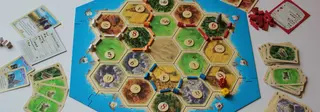
Game nights are wonderful ways to create social activities for both friends and newly-met acquaintances. They can be fun, educational, and memorable and may even turn into a regular tradition. But before planning a game night, keep in mind that many people have been through a bad gaming experience. It only takes one negative experience to turn people off of the concept altogether.
As a regular game night host and guest, here are my five steps to making your next game night experience as positive as possible.
1. KNOW YOUR GOALS
If your number one goal is winning, as opposed to having fun and enjoying friends’ and family members’ company, you’re hosting game night for the wrong reasons. Think about why you’re gathering folks in the first place. Are you trying to expose the kids to taking turns, strategy, or just introducing a new way to bring the family together? Often just the act of “calling” your favorite colored game piece or unfolding the board and laying it out evokes happy memories and becomes a cherished tradition. It often uncovers new learnings about ourselves that can even foster new passions.
Or, are you looking for ways to better connect with friends or switch up the typical Saturday evening festivities? Know going into the night why you’ve chosen this route in the first place. While everyone can appreciate (and even benefit from) healthy competition, make sure your priorities are in the right place. Playing a game is a tangible, shared opportunity to escape from everyday realities and express oneself in interactive, engaging ways. It should be fun, not stressful.
2. KNOW YOUR ENVIRONMENT
Will everyone be playing at a single table? Will you have several games going simultaneously? Will they be loud games? How much space for games, drinks, snacks, and onlookers will you need? Obviously, you want people to socialize, and, whether they are players or spectators, they still should feel like they are part of the fun.
Will the food you serve end up all over your games? Often, if I can’t control the crowd or the type of food that will be involved (and especially if alcohol is involved), I will make the decision to purchase a copy (or copies) of games for party play, separate from the games in my personal collection.
3. KNOW YOUR GAME LIMITS
All games are not created equal. The more rules you have to explain, the greater the chance people may lose interest before the game even begins. Consider offering your guests a vote on the games they’d like to play or provide links to demonstration videos in advance.
Choose games that don’t take a long time to play, unless you’re sure everyone is going to spend the entire evening playing just one game. Games that take 20 to 40 minutes allow players to rotate players in and out, and offer everyone a chance to play, socialize, snack, and relax are a good choice. Make gaming a part of your party, or even the theme, but don’t make it the only thing!
4. KNOW YOUR AUDIENCE
The most important thing, by far, is knowing who is coming over to play. How many people will you have? Are they all the same age, or will there be a mix of ages? Have they played games before, or will this be a new experiment? Take a moment to reflect on the people and what games would be appropriate for them.
If you’re all of the same age, many party games will give you the opportunity to play as a large group. Team games, in particular, let people participate at whatever level they desire. If children and adults are involved, consider breaking the group into two groups for play, or play games that involve skills that children are good at (like memory or dexterity).
5. KNOW YOUR BACKUP PLAN
Sometimes, you’ll get a bad mix of players or a game that just doesn’t work for the group involved. Don’t be afraid to simply end a game (with the agreement of the players, of course) and move on to other activities. Put some thought into how to seamlessly move on to something new if/when the game doesn’t take off.
If you enjoy a game, you will be its best advocate. Your enthusiasm will signal your guests that they should expect to have fun on game night.



